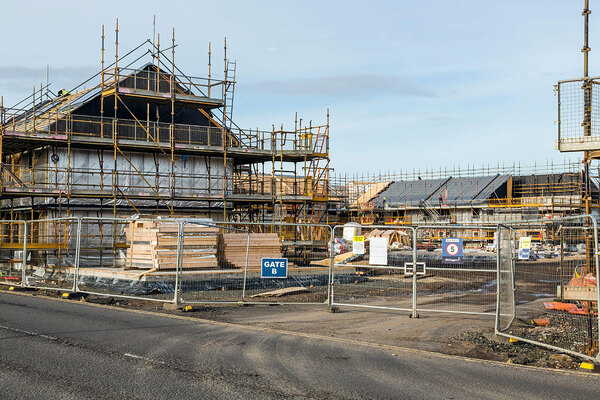Compulsory purchase orders aren’t the answer
Ian Barnett, national land director of Leaders Romans Group, asks if compulsory purchase is the right solution to the lack of social and affordable housing
A considerable increase in affordable and social housing is one of the new government’s central policy pledges. In Labour’s general election manifesto, as part of an aspiration to “deliver the biggest increase in social and affordable housebuilding in a generation”, the party pledged to “further reform compulsory purchase compensation rules to improve land assembly, speed up site delivery, and deliver housing, infrastructure, amenity, and transport benefits in the public interest”.
Compulsory purchase is not new, but it tends to be used for large-scale infrastructure schemes considered to be in the national interest – such as HS2 or the Olympic Park – rather than housing schemes.
Labour has committed to building a “new generation of New Towns” and some compulsory purchase would almost certainly be necessary for this purpose. But New Towns do not appear to be on the immediate policy agenda and the Planning and Infrastructure Bill seems to encourage the use of compulsory purchase for much smaller housing schemes.
Small-scale housing schemes from small and medium-sized enterprise (SME) developers is already well along from where it was just a few years ago. Many providers have left the market, given the high costs – which include the Community Infrastructure Levy, Biodiversity Net Gain, Section 106 contributions and affordable housing – alongside the time and risk associated with obtaining planning permission and unpredictable local politics.
“Using compulsory purchase to create small-scale social housing schemes which might occupy a few acres of land creates an unnecessary amount of legislation and expense which would achieve little in the face of the considerable housing shortfall”
My belief is that compulsory purchase exists for very specific purposes and it is not the right solution for this specific problem. The housing crisis hasn’t been caused because we haven’t got enough land, but because we have not seen the large-scale schemes that are necessary to make a difference.
Using compulsory purchase to create small-scale social housing schemes which might occupy a few acres of land creates an unnecessary amount of legislation and expense which would achieve little in the face of the considerable housing shortfall. In reality, very few local authorities will have the funds to put this into practice.
Communities are much more than homes. To function successfully, they must provide transport and community infrastructure, and sustainability in everything from active travel to energy efficiency. As such it makes sense if they are delivered at scale.
New Towns unquestionably have a significant role to play in addressing the housing crisis. Delivered with government support, New Towns can be considered to be in the national interest, mainly because of the broader infrastructure needs they address.
Take Milton Keynes, for example. It was expensive (the initial debt incurred in the early 1970s was only fully paid off in the 2000s), but Milton Keynes enabled vastly improved east-west transport by road (with East West Rail to follow), along with considerable sporting and cultural facilities. With a population of 230,000 and a large proportion of young families, is has successfully addressed a housing shortage in the northern Home Counties and supplied a sizeable number of affordable homes.
“There is a strong case to be made for New Towns being in the national interest and being delivered with government support, often through specific legislation”
On the whole, people are more supportive of New Towns than of piecemeal development, especially if the towns bring services from which they can benefit. There is a strong case to be made for New Towns being in the national interest and being delivered with government support, often through specific legislation.
Importantly, it should be recognised that compulsory purchase is not a quick fix. The compulsory purchase order process frequently involves lengthy negotiations with multiple landowners, legal challenges and delays. Landowners may choose to challenge decisions through judicial review, further prolonging the process. As such, it is far from the quick and efficient means of unlocking land for new development which is needed. There have been instances where compulsory purchase orders have taken more than 20 years.
New Towns also take many years to progress, but the results of the process are invariably greater. My advice to those currently drawing up the Planning and Infrastructure Bill is to concentrate on the big wins. There are other ways to speed up planning and to ensure that we build a range of housing in the right locations. Don’t break up smallholdings for the sake of 10 social housing units, and destroy a farmer’s livelihood in doing so. It could also potentially cause delay, frustrations and costs, and ultimately achieve a slowdown of housing delivery, not to mention the legal quagmire of applying compulsory purchase order powers retrospectively on sites that are under contract to developers.
Instead, the government’s considerable majority should be utilised to speed up the planning system and encourage SME developers to get building, provide for New Towns legislation, use centralised planning resources to ensure the best location, size and community benefits to align with public interest and national infrastructure and, in doing so, deliver productivity rather than financial hardship and delay.
Ian Barnett, national land director, Leaders Romans Group
Sign up to the Regulation and Governance Conference 2024
At a time of major regulatory change, the Regulation and Governance Conference is designed to give board members and governance and risk professionals the insight they need to plan and prioritise effectively.
Join more than 250 delegates and 45 speakers to confidently navigate the change ahead and ensure you have the right governance structures and assurance frameworks to keep tenants safe and run a viable business.













